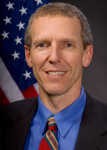Clean water serves American ag, community and business health

When Congress passed the Clean Water Act in 1972, it didn't just defend the mighty Mississippi or Missouri rivers from pollution. It also protected the smaller streams and wetlands that flow into rivers like the Loup, Elkhorn, Lower Platte, and Niobrara in Nebraska. Streams and wetlands are crucial for fishing, hunting, tourism, agriculture, recreation, energy, and businesses.
Under the Clean Water Act, EPA and the U.S. Army Corps of Engineers released a draft proposal in March that strengthens protection for clean water. Science shows us what kinds of streams and wetlands impact water downstream -- so our proposal says that these waters should be protected.
America thrives on clean water. One in three Americans -- 117 million of us -- get our drinking water from streams, creeks, and wetlands currently lacking clear protection. And safeguarding smaller streams is crucial for our economy, too -- as recent water contamination in Toledo, Ohio, showed.
I want to make sure you know the facts. The EPA intends to protect clean water without getting in the way of farming and ranching. Normal farming practices including planting, plowing, and harvesting have always been exempt from Clean Water Act regulations. Our proposal doesn't change that.
The Clean Water Act only deals with the pollution and destruction of waterways -- not land use. Also, the proposal does not regulate new types of ditches, does not apply to groundwater, and does not change the exemption for stock ponds. EPA is not interested in a final rule that will make farming more difficult.
I understand that people have questions and concerns about the proposal. We work daily to address them because everyone agrees that protecting the long-term health of our nation's waters is essential. The public comment period for the proposal is open until October 20, and we encourage your input to make sure we craft a strong, workable final rule.
The comment process is enriched when we hear from landowners, the business community, farmers, scientists, conservationists, energy companies, states and local governments. The agencies need to hear valuable experience, clear perspectives, and important information. We will not complete the rule until we have carefully reviewed the public comments, until our scientific analysis and peer review are complete, and until we have worked to make the rule understandable, technically accurate, and legally correct.
More information is at http://www2.epa.gov/uswaters.
-- Karl Brooks is administrator for U.S. EPA Region 7, which includes Nebraska, Iowa, Kansas, Missouri and nine tribal nations. He makes his home in Lawrence, Kan.
